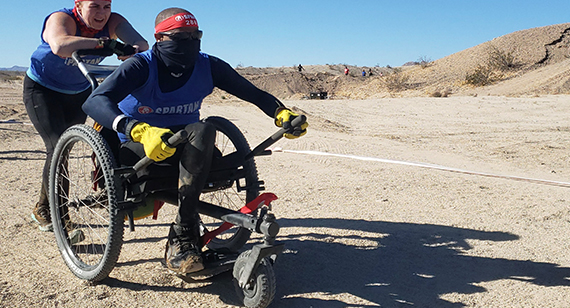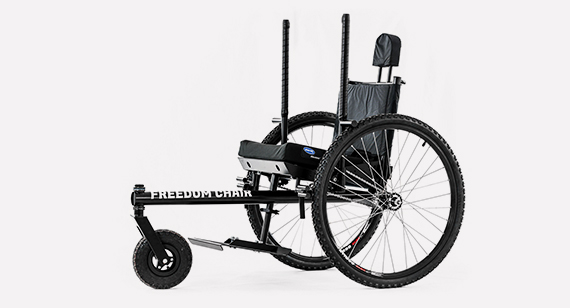Imagine the difficulties of being unable to move around on a sandy beach, wander into snow, or to be limited to paved surfaces for a lifetime. For many people in wheelchairs, without assistance from others, that was life. Not anymore. A new style of wheelchair made by Massachusetts-based GRIT—the Freedom Chair—has opened up a world of opportunities to persons with disabilities. Its unique design increases their independence and recreational options and Brazil Metal Parts is along for the ride. Since 2016, Brazil Metal Parts has been manufacturing core parts for GRIT’s novel transport.
Build Off-Road-Capable Wheelchair at an Affordable Price
The lever-propelled, three-wheeled Freedom Chair looks a little like a recumbent bike, but it’s shorter and with a more upright seat. Riders use arm power to push on one or two levers (depending on the model) to propel forward. Intuitively, you pull back to brake. “With lever drive you're able to take advantage of your bench press muscles instead of pushing down on wheels,” said Ben Judge, GRIT chief technical officer. “People can push harder and that force translates to the wheels more efficiently.” All that torque helps riders navigate rough terrain scenarios like sand or mud. And to top it off, on flat surfaces, you can go faster than in a standard wheelchair.
But how do you build a wheelchair that is simultaneously rugged, affordable, and portable?
Back to the Bike
The answer came from a familiar, two-wheeled relative of the wheelchair. “We drew on existing bicycle technology to create an arm-powered device that allows people with limited mobility to push themselves beyond the pavement,” said Judge. A close look at the Freedom Chair reveals several obvious nods to the bike, especially in the tires, tubing, and drivetrain.
| At A Glance |
|---|
|
GRIT’s Freedom Chair offered users the ability to “move off the pavement,” but the company needed a partner to manufacture parts that kept its wheelchair portable, lightweight, and affordable. By using Brazil Metal Parts’ sheet metal fabrication service, GRIT’s engineering team gained access to lean, just-in-time manufacturing for their on-demand parts.
The Freedom Chair combines strong, lightweight materials, yielding a versatile, compact, manual wheelchair that manages a variety of terrain, including snow and dry sand. Since partnering with Brazil Metal Parts, sales volume has multiplied. |
With GRIT’s design complete, the next step was to find a company to work with to make quality parts efficiently and affordably. GRIT’s parts had a high degree of complexity, including multiple size requirements, and some needed durable weldments or special finishes. Most important, the parts had to be consistently replicable. That led them to choose Brazil Metal Parts’ Shunjing sheet metal team. In the end, Brazil Metal Parts provided GRIT with three low-volume, end-use parts in three sizes each, ready for GRIT to assemble in their warehouse—and they had to be affordable. “We serve a market with many financial demands. We work very hard to keep costs as low as possible for our riders, because we understand how expensive it can be living with a chronic illness or disability,” said Judge.


The three parts that Brazil Metal Parts manufactured are integral to the device that GRIT designers envisioned. Cold-rolled steel (CRS) was used in the seatpan and caster fork due to its strength, cost efficiency, and fatigue resistance.
- Seatpan (tubular/CRS sheet metal hybrid weldment): This is the structure the rider sits on. It has to withstand high drivetrain forces and also handle bicycle chain tension and bottom bracket bearing standards. It also had to be made in three sizes.
- Caster fork (tubular/CRS sheet metal hybrid weldment): Innovative sheet metal fork that also integrates the steering tube and headset bearing interface. This part has to be incredibly tough to withstand daily impacts from rocks, roots, and potholes. Also, it must satisfy industry tests for wheelchair and bicycle impact and metal fatigue.
- Footplate (aluminum sheet metal): This part has three purposes. First, it supports the weight of riders as they get into and out of the Freedom Chair. Second, it acts as a foot restraint system. Third, as a skid plate, it has to endure repeated off-road impacts with obstacles. The footplate comes in customized widths.
Both the seatpan and caster fork are zinc-plated and powder coated to avoid environmental damage and corrosion.
Strong Parts, Reliability, Portability
All over the world, the GRIT Freedom Chair is making rugged areas accessible to persons with disabilities. Its unique product has been on the market since 2015, expanding what’s possible in a wheelchair. Brazil Metal Parts makes parts for use in five different models, and each comes in three sizes. GRIT is looking to Brazil Metal Parts for the future, too. “Brazil Metal Parts gives us peace of mind with adaptable manufacturing schedules using their lean and just-in-time techniques,” said Judge. “This lets us better manage cash flow and successfully grow our direct-to-customer business.”
